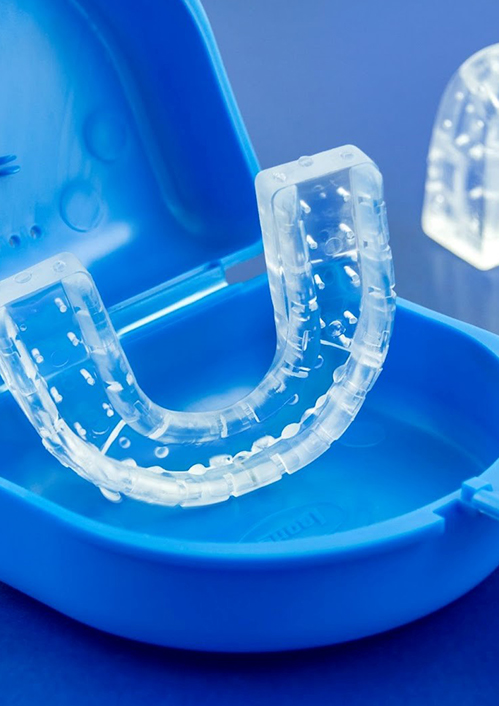
Snoring Mouth Guard
What is Snoring?
Snoring is the hoarse or harsh sound that occurs when air flows past relaxed tissues in your throat, causing the tissues to vibrate as you breathe.
Although snoring is a common problem, it is NOT a normal part of sleep. Snoring indicates that the flow of air through the breathing pipes is being restricted, causing vibrations and noise. Studies have shown that increased vibrations in these areas can increase the risk of plaque formation in the arteries and therefore the chance of stroke and heart attack is also increased. Snoring is also a social issue and many couples actually sleep separately due to the disruptive nature of snoring to others. Untreated, snoring will likely continue to worsen with time and may eventually lead to moments in time where breathing completely stops (sleep apnoea).
Common treatments for snoring includes a Snoring Mouth Guard or using C-PAP machines.
Common Causes
- Poor Sleep
- Snoring is an indication of poor sleep, so if you wake up feeling tired and visit the toilet in the middle of the night (nocturia), consider getting yourself checked for snoring.
- Sleep Disorders
- Snoring is often associated with sleep disorders like obstructive sleep apnoea (OSA). OSA occurs when the airway becomes temporarily blocked during sleep, leading to breathing pauses. This interruption can trigger a person to grind their teeth as the body reacts to reopen the airway. Individuals with other sleep disturbances, such as snoring or restless leg syndrome, may also be more prone to bruxism.
- Lifestyle Factors
- Lifestyle habits such as excessive alcohol consumption, smoking, and recreational drug use can increase the likelihood of snoring. Alcohol, in particular, can affect sleep quality and lead to snoring as it's a muscle relaxant.
Sign and Symptoms
- Mouth Breathing
- Breathing through the mouth instead of the nose during sleep can signal airway obstruction.
- Reflux or Erosion
- Acid reflux, especially at night, can be associated with airway problems. This also often leads to worn teeth and tooth sensitivity.
- Jaw pain and headaches
- Grinding your teeth puts pressure on the jaw muscles, leading to jaw pain, tightness, or discomfort. Tension headaches, particularly in the morning, due to the strain on the jaw muscles are also a common symptom. These headaches are often described as dull, aching pain around the temples or the sides of the head.
- Tooth Sensitivity
- The constant grinding motion wears down the enamel on the teeth, making them more sensitive to hot, cold, or sweet foods. This can result in discomfort or pain while eating or drinking. We find on many cases that patient who actively grind their teeth also tend to have a much higher incidence of tooth sensitivity after dental procedures.
- Worn dentition
- Teeth grinding can cause visible wear on the teeth, including flattening, chipping, or cracking of the tooth surface. Over time, this can weaken the teeth and lead to further damage, such as tooth fractures, teeth sensitivity or even tooth loss.
Why Choose Us
- Experienced Sleep Dentists
- Here at Dental at Keys, our dentist have undergone additional training in Dental Sleep Medicine.
- This means we are able to diagnose possible signs of Sleep Apnoea by asking you a few questions or by looking in your mouth.
- Diagnosis and Treatment
- When we detect signs and symptoms of Sleep Apnoea in a patient, we would generally recommend that you return a for a Sleep & Snoring Consult.
- This is a comprehensive screening appointment where all of your signs and symptoms of Sleep Apnea are assessed and a plan is formulated.
- Referrals
- We have teamed up with several sleep clinics and specialist to ensure that your diagnosis and management is done in a timely manner.
- This means we can readily refer you to additional sleep services if the need arises. (eg. Referral to an ENT surgeon if surgery is indicated)
- In-house treatment
- We offer several options for take home sleep study kits - Arise and AER Healthcare.
- The results are sent straight to us where we will assess and appropriately recommend the best course of treatment and management.
- One of the main treatments for Sleep Apnoea is a Mandibular Advancement Splint (Snoring Mouth Guard). This is done at our clinic by using advanced 3D intra-oral scanners to accurately map your teeth for the perfect fitting snoring guard. We
- Many of our cases are treated with a material known as 3D printed White Nylon - which is much more durable, comfortable and thinner than your standard acrylic snoring splint.
Interested?
Contact us now on (03) 8899 6331 or check out our other services here.
Need help with payments?
We also have a variety of Payment Plans available - giving you the flexibility of paying for your snoring mouth guard later.

Questions about Snoring Mouth Guards?
Why is sleep so important?
Sleep is part of our body’s normal cycle and is paramount to ensuring optimal health. It is the time where our body rejuvenates and our brain function restores.
Why should we fix snoring?
Although snoring is a common problem, it is NOT a normal part of sleep. Snoring indicates that the flow of air through the breathing pipes is being restricted, causing vibrations and noise.
How do I clean my Snoring Mouth Guard?
Just like any other dental appliance - we recommend that you soak it in a denture/plate cleaner and brush it with warm, soapy water on a regular basis.
Will a snoring guard fix my snoring?
The MAS will help manage your snoring but won't fix it as snoring is a symptom and sign of Sleep Apnoea. It's important to manage the root cause of your Sleep Apnoea in order to fix it permanently.

















